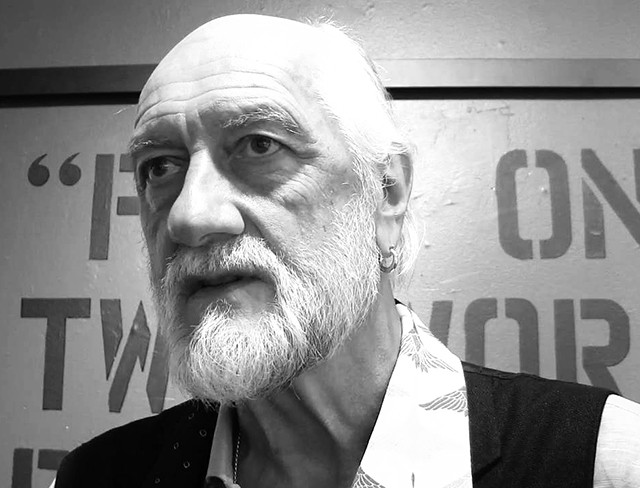When it comes to rock n’ roll, everybody pays attention to the singer, and guitarists are worshipped for their face-melting solos. But the drums — the drums are the backbone of the music. And if there has ever been a drummer that has been the backbone of his band, it’s Mick Fleetwood. As co-founder of the legendary group Fleetwood Mac, the 67-year-old British musician has remained the one constant in a rock act that’s had more than its fair share of line-up changes and inner turmoil. From the band’s blues-driven beginnings with Peter Green to its folksy pop-rock incarnations during the Lindsey Buckingham/Stevie Nicks eras, Mick Fleetwood has been there, done that, and publicly shared the whole sex, drugs, and rock n’ roll saga.
Listen to the full interview below:
In his 2014 autobiography, Play On: Now, Then, and Fleetwood Mac, the band leader recalls moving to London as a 15-year-old and beginning his exciting but rocky journey to the top of the music charts. He spoke with CBC Radio Q guest host Tom Power about his memoir, and particularly the earlier years of Fleetwood Mac. Here are some highlights from the interview:
His thoughts on why English youth were so drawn to blues rock in the 1960s:
“Well, it’s fair to say coming out of the Second World War, we were ripe for the picking. I think we just so didn’t want to become conformed into [conventional British society]. There were huge amounts of depressed people, half of England was flattened with all the bombing that went on, and you just wanted to see a way out. And blues — blues is about a way out. They sang and they chanted their way out of the misery that faced black Americans way back when, so there was an identification of sorts, by no means as acute, but that was a type of music we were hooked on.”
He’s not known as a flashy drummer, but he’s legendary for his ability to keep the beat. Here’s how he developed his reputation as a master timekeeper:
“You can’t play your way around complicated jazz structures and weird time structures – you have no idea what that is, and you’re probably never going to,” he said he told himself. “But at least I hung on to that one thing — which is the feel, which you learn from blues. And you follow it like a hawk.”
His first impressions of iconic blues guitarist Peter Green, who he co-founded Fleetwood Mac with:
“I learned very quickly Peter had that magic, which is: less is more.”
In one of the more bizarre stories of rock n’ roll history, a dispute with the band’s former manager led the manager to assemble an imposter Fleetwood Mac band in 1974 and booked a tour under the group’s name. It took a fierce legal battle for Fleetwood to regain control of the rights. His memories of the experience:
“It was astoundingly not a great period. We had to fight for our lives and for our right to be in a band that I’d formed in 1967 with Peter Green. And my name was [being used by the fake band]. It was pretty mind blowing. The band that toured even had someone with blonde hair who vaguely looked like Christine McVie, except he was a guy.”
Purchase Mick Fleetwood’s “Play On”
Amazon
Barnes & Noble
